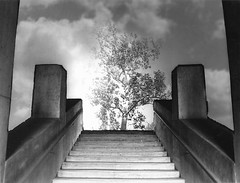One of my
favorite quotes. I love writing novels, even though they are categorized as
fiction – a term that most people equate with 'false' or 'made up.' The implication is
that novels are a waste of time, or not serious, not worthwhile. In writing
novels, I in no way think I am wasting my time or anyone else's.
Non-fiction (reality) must only be possible; Fiction must be probable.
Non-fiction (reality) is random data points; Fiction is a hypothesis.
If the
fiction, the hypothesis, rings true, the reader's entire perspective on life
can change. Perspective shapes motivation; shapes action; shapes results. What
resonates with the reader can be the overarching theme of a novel, a particular
scene ... a particular phrase. The point is the reader (the receiver) is actively
engaged. A bar has been set, and it may be high. The author must transmit
something useful, that passes the standards of the reader, or it will be utterly
discarded.
Non-fiction,
memoirs included, presents itself as an unquestionable fact. The reader is
obliged to suspend disbelief; to accept. This account must be accepted since it
is 'true'. Non-fiction is usually
compelling when it describes an extra-ordinary event; a corner case. This is
usually outside the experience of the reader, so it provides a valuable
broadening of perspective. Readers can learn about a remarkable event in condensed
time without being exposed to physical danger, and build a world view from a
larger foundation – incredibly valuable. Unfortunately, this aspect of
non-fiction can also be abused, either well-meaning or otherwise.
I am
particularly annoyed by many works of fiction that present themselves as
memoirs. I see it as an underhanded ploy to remove the standards set by the
challenge of writing quality fiction. Fictional memoirs, such as Memoirs of
a Geisha, that present themselves as non-fiction for added 'realism'
artificially bypass a reader's healthy skepticism. (I love insights into new worlds, and had thought it was a good book when I first read it, but was under the impression it was a true memoir at the time, so now I don't remember how much of it I would have thought was contrived had I known it was fiction.) These books reap the benefit
of the readers unquestioning acceptance of a 'truth' - an abuse the readers
enthusiastic desire to learn. In the short term, it generates exaggerated interest and bolsters the author's sales; in the long-term, it only serves to mislead; create noise; cloud judgement.
Writers of
fiction essentially allow the world to label them as false, and have only
hope that the truth will resonate and be useful. It is certainly true that many
novels of fiction seem trite, contrived, random, pointless … and maybe they
are, but that's fine. Bad ideas from one person's perspective, might provide
someone else with a valuable benefit. Some food might be empty calories, but
other entrees might be both delicious and nutritious. It's an individual
choice. Over time, the most resonant fiction survives the ages and continues to
inspire new generations. That is a challenge, but a worthwhile challenge.
I've been in
the process of researching the ancient world for at least the past 10 years. It
will be an underlying foundation for the next series of novels I am about to
write. Just one of many layers that I hope will help give the stories added
value and meaning even if all that background work is barely noticed. (For me,
it's already been an unexpected and amazing journey to see the larger patterns
of history and the motivation behind many aspects of our lives we take for
granted. One of those unexpectedly tied in with food and how grains became a
main staple of our diet. It in part provided motivation to re-evaluate this and
experiment with the Paleo diet – a previous blog post.) For my first novel, I
did create the world from the ground up, but then realized that if the world
was set in our own remote past, that readers would have the opportunity to
learn about or own history without any extra effort on their part. As I'm doing my research, if I ever need to talk to
someone in academia, I've found it best not to even mention that my research is
for fiction, because all too often the common response is something like: "Oh, then why bother with facts? Just make something up, if it's fiction." #$(^@&!!!
by Laura A Knauth


No comments:
Comments Welcome!